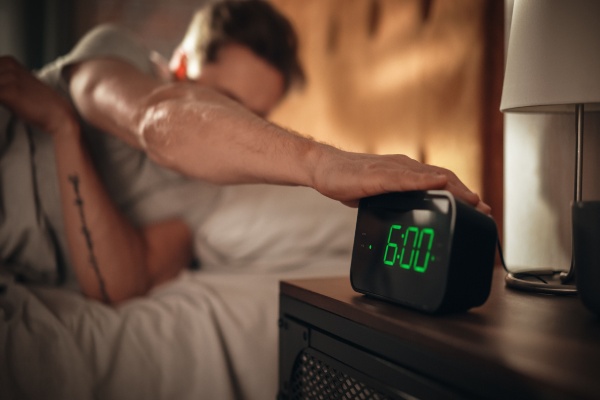Getting out of bed in the mornings can be tough – especially during a long cold winter – and more often than not, you may be tempted to hit the snooze button to sneak in a few extra minutes of sleep. But experts say the habit may not necessarily be the healthiest one.
As Health magazine reports, hitting snooze can disrupt a person’s sleep cycle, but more concerning, it could be an indicator that someone is suffering from an even bigger issue: sleep deprivation. “The fact that you need an alarm in and of itself tells you that you’re probably skimping on the amount of sleep your body needs,” Sunjay Kansagra, MD, professor of child neurology and sleep medicine at Duke University Health, told Health. “If you feel so sleepy that you need to hit the snooze button, that’s another sign that tells you that you are probably skimping [on sleep] much more than you should.”
Snoozing May Make You Feel More Tired
Pressing snooze on an alarm does allow the body to get back to sleep, Dr. Kansagra explained, though those extra minutes may not actually be that helpful. When a person’s alarm clock goes off in the morning, they may be woken up from rapid eye movement (REM) sleep, Dr. Kansagra said. REM sleep typically happens later on in a person’s sleep—this is when the brain is active and people often dream.
But once someone’s been woken up from REM sleep, Dr. Kansagra added, they may fall back into a lighter sleep. “[The next few minutes of sleep] may not be as refreshing as if you were to spend those minutes in deeper sleep,” he said.
There is a chance that someone could fall back into REM sleep after snoozing their alarm, said Patrick Fuller, PhD, neurologist and professor of neurological surgery at UC Davis Health. But even continuing in deeper sleep while snoozing presents some issues. “You might throw yourself, for example, back into a REM cycle,” Fuller told Health. “It’s very confusing to the brain—you wake up foggy, disoriented.”
This could be linked to a phenomenon called sleep inertia, which is that feeling of grogginess, disorientation, or slower thinking that many people experience after waking up in the morning or from a longer nap. Researchers are still trying to come to a conclusion about the relationship between sleep inertia and depth of sleep. But waking up from a deeper sleep may lead to greater sleep inertia, or grogginess—in a study of mice and rats, researchers found that neurons were “off” or slower to fire when waking up from REM sleep versus non-REM sleep.
As a result, pressing snooze repeatedly may actually make someone feel more disoriented and tired after they get out of bed, Fuller said.
If a person has the extra time to hit the snooze button in the morning, Dr. Kansagra said, the healthier option would be to simply get up with one alarm instead of multiple. “Just set your alarm to the latest possible time you can wake up,” he said. “That way you’ve guaranteed yourself getting as much sleep as possible that’s better quality, rather than having to hit the snooze button multiple times.”
A Sign of Sleep Deprivation?
Though snoozing may not be part of an ideal part of a person’s sleep routine, Fuller said, it’s certainly not dangerous. The real concern with pressing the snooze button frequently is that it’s likely a symptom of a much larger issue.
Though it may seem improbable, experts agreed that in a perfect world, people shouldn’t even need an alarm clock to wake up in the morning. They should rather wake up naturally once the body has gotten as much sleep as it needs. “The issue isn’t so much the alarm clock and the snooze button itself, it’s that you’re sleep deprived and you just need to get more sleep,” said Fuller.
And this is, unfortunately, quite common. In one study just over half of people—about 57%—reported needing multiple alarms to get out of bed in the mornings. And about one in three American adults aren’t getting enough sleep, with almost 40% saying they fall asleep during the day without meaning to at least once a month.
There are still many questions surrounding snoozing and how it affects health long term. But the data on sleep deprivation is clear—it’s been linked to type 2 diabetes, depression, obesity, and heart disease, and it can create dangerous situations while people are driving or working.
—
Photo Credit: Gorodenkoff / Shutterstock.com
